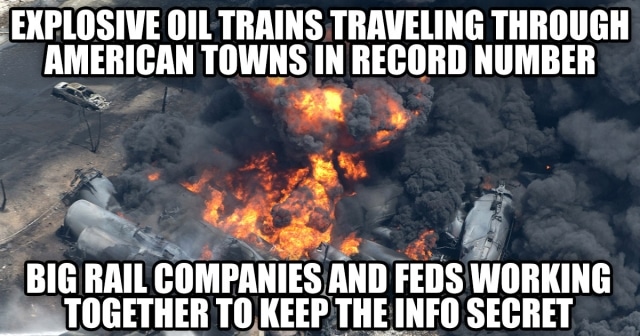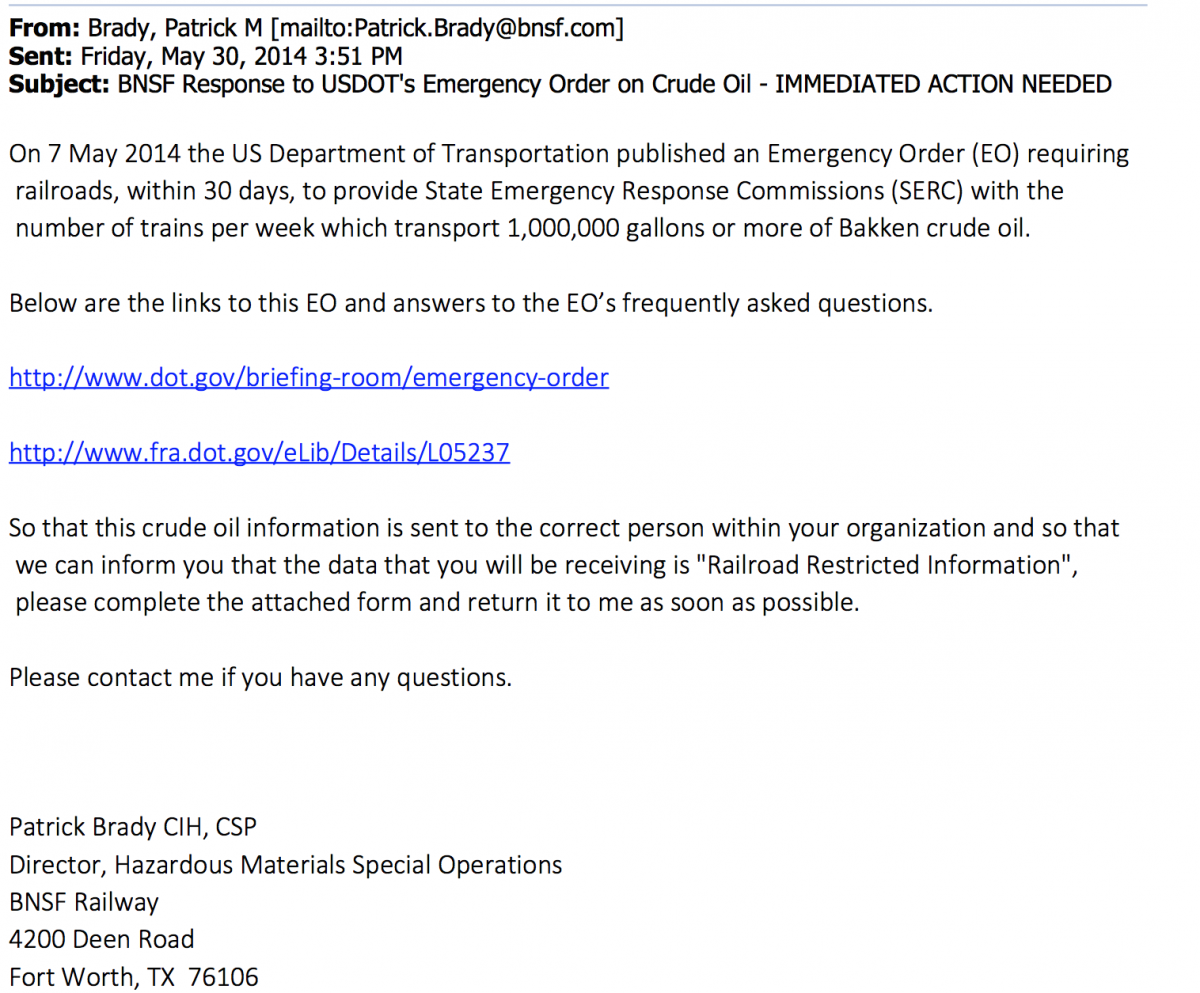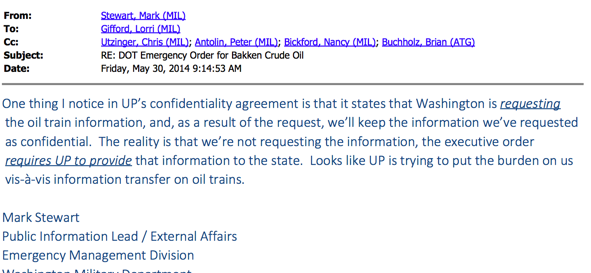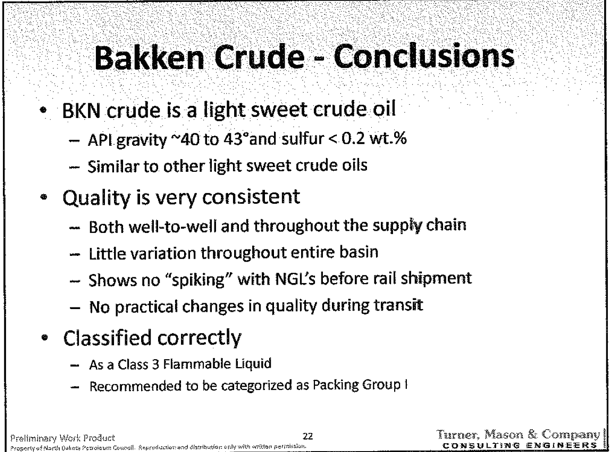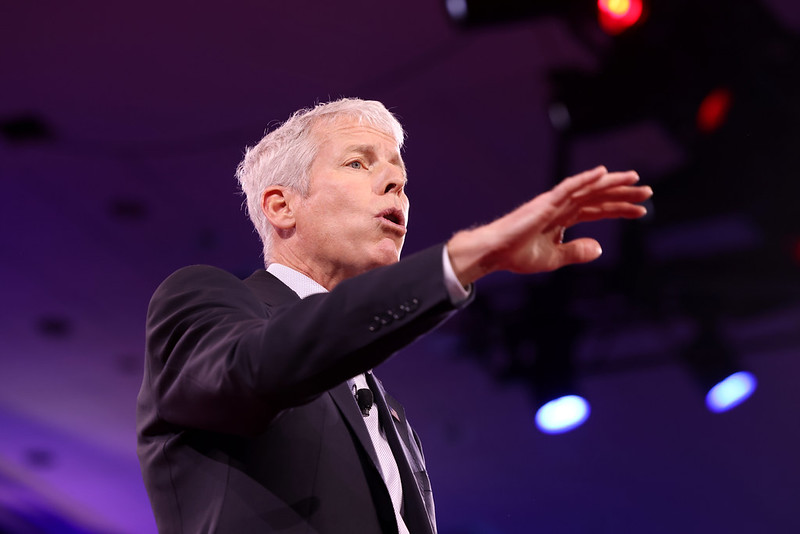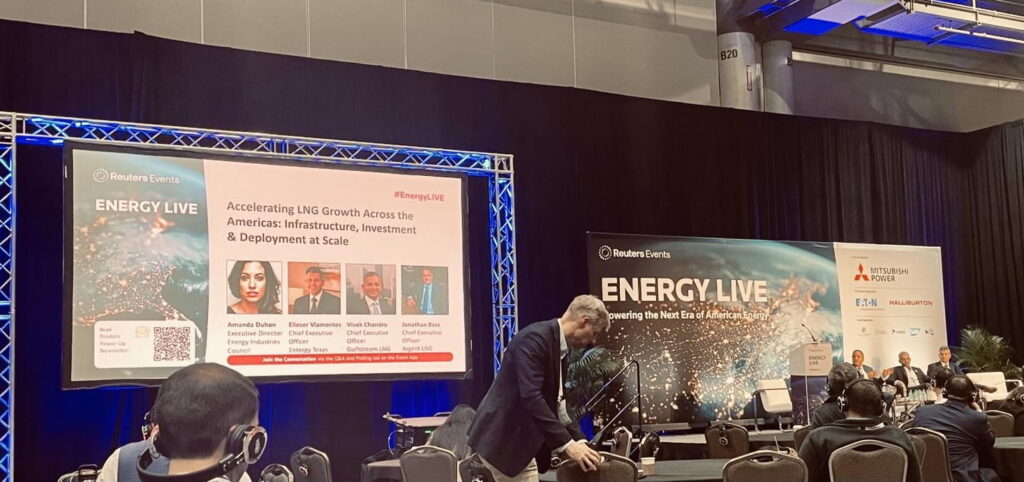Documents released to DeSmogBlog by the Washington State Military Department reveal that both the Department of Transportation (DOT) and rail companies attempted to pressure states including Washington to keep information about Bakken crude oil trains from the public.
As previously reported on DeSmogBlog, while rail companies have been asserting that information about the frequency and routes of Bakken oil trains was “security sensitive,” the Federal Railroad Administration and the Transportation Security Administration were saying the opposite.
However, that didn’t stop the Department of Transportation from pressuring states like Washington only to release information on a “need to know” basis. A document provided to the states by the department argues against the public’s right to know:
This data is intended for those persons with a need-to-know; that is, first responders at the state and local level, as well other appropriate emergency response planners. DOT expects the SERCs to treat this data as confidential, providing it only to those with a need-to-know, and with the understanding that recipients of the data will continue to treat it as confidential.
The Department of Transportation went on to explain why it thought it was “appropriate” to keep the oil train information from the public.
Historically, railroads and states have routinely entered into confidentiality agreements prior to railroads providing states with information on commodities transported in trains within their jurisdictions, as this information has traditionally been viewed as confidential from business and security perspectives. DOT believes that following precedent and sharing the data required by this EO [Executive Order] under confidentiality agreements is appropriate.
What does that mean? The states have been given instructions by the Department of Transportation to keep this information from the public.
In a May 22nd e-mail from Patrick Brady of rail company Burlington Northern Santa Fe (BNSF) to members of the Washington State Military Department, Brady makes it clear that BNSF is still seeking guidance from the Department of Transportation on this matter.
We have asked for clarification from the DOT on the emergency order as it relates to if the information is actual/historic or forecasted and if the information will be considered security sensitive. We are anticipating a response by COB Friday 5/23.
On May 30th, Brady sent another e-mail to Washington with a new term: “Railroad Restricted Information.”
“So that this crude oil information is sent to the correct person within your organization and so that we can inform you that the data that you will be receiving is “Railroad Restricted Information”, please complete the attached form and return it to me as soon as possible,” he wrote.
The form that the state of Washington was asked to sign included the following language:
If the recipient of this agreement or any of its representatives receives a request to disclose any part of the Confidential Information under the terms of a Freedom of Information Act request, subpoena or order issued by a court or other governmental body with the power to compel compliance with its requests, the recipient shall (i) notify BNSF Railway Company immediately of the existence, terms and circumstances surrounding the request, (ii) consult with BNSF Railway Company on the advisability of taking legally available steps to resist or narrow such requests, and (iii) if disclosure of such Confidential Information is required to prevent the recipient from being held in contempt or subject to other penalty, (iv) furnish only such portion of the Confidential Information as, in the written opinion of counsel satisfactory to BNSF Railway Company, the recipient is legally compelled to disclose, and (v) use its best efforts to obtain an order or other reliable assurance that confidential treatment will be accorded to the disclosed.
While this correspondence was occurring, there were internal e-mails between members of the Washington Military Department’s emergency management division, in which the pressure from another rail company, Union Pacific (UP), was noted.
Despite the pressure from the Department of Transportation and the rail companies, the state of Washington released the information to the public and, as reported by The Columbian, the rail companies backed down.
“BNSF does not intend to file an injunction regarding prospective handling of the information provided,” spokeswoman Courtney Wallace wrote in an e-mail Monday. “The determination about how such information is controlled or communicated is ultimately a decision for the federal government and subsequently the Washington State Emergency Response Commission.”
Several states, including Wisconsin and North Dakota, have followed Washington’s example and released the information regarding the oil trains. However, despite the lack of legal justification for keeping this information from the public, other states, such as New York, have delayed releasing this information, or have said they will not release it, as is the case in Pennsylvania. Some, such as New Jersey, have even signed the railroad confidentiality agreements.
Meanwhile, as this battle over the public’s right-to-know continues, the oil and rail industries continue to hold private meetings with the White House’s Office of Information and Regulatory Affairs (OIRA) regarding the new oil-by-rail regulations. Meeting logs show industry lobbying against regulations it publicly speaks in favor of.
In addition to the meetings previously documented by DeSmogBlog, on June 24 oil giant Shell met with the White House. Next up, the Office of Information and Regulatory Affairs met with the North Dakota Petroleum Council on July 7. Based on the council’s presentation materials, they argued that Bakken crude was no different from other crude oils.
Slide from July 7th OIRA presentation.
MoneyNews is now reporting that the American Association of Railroads and the American Petroleum Institute met with the White House on July 11th and presented their desired version of the new regulations in yet another example of how industry lobbyists essentially write the regulations for their own industries.
The White House is scheduled to release the new regulations on the transport of oil by rail this month.
Subscribe to our newsletter
Stay up to date with DeSmog news and alerts


